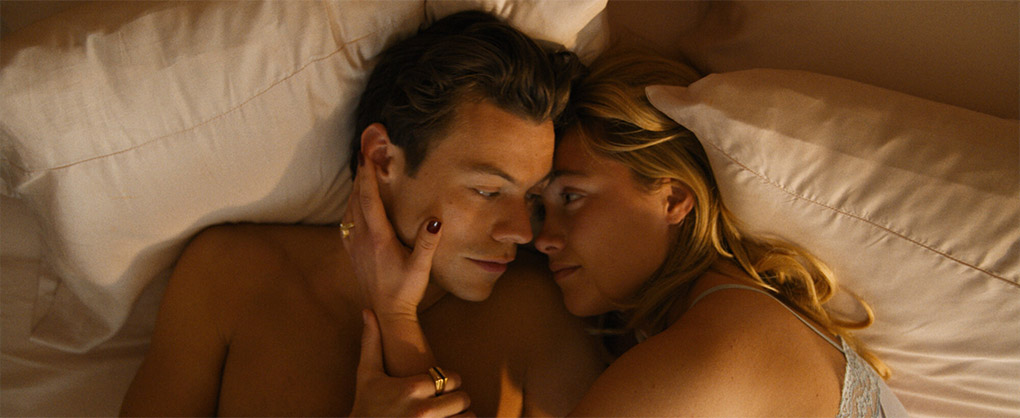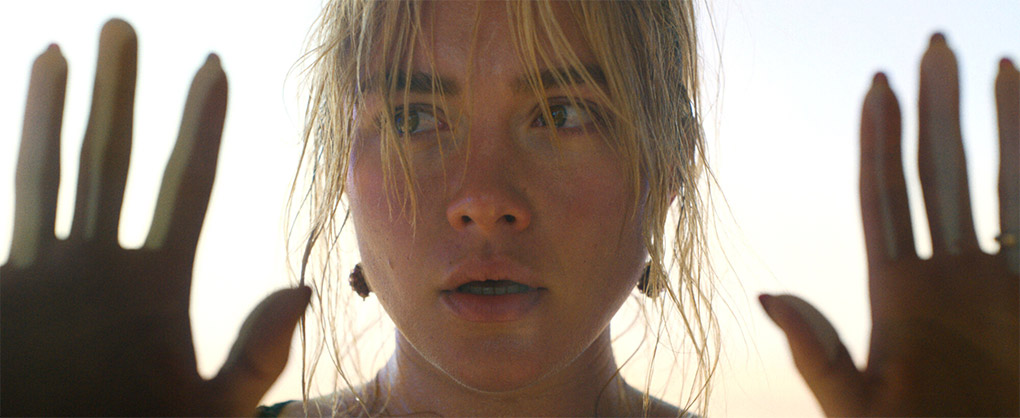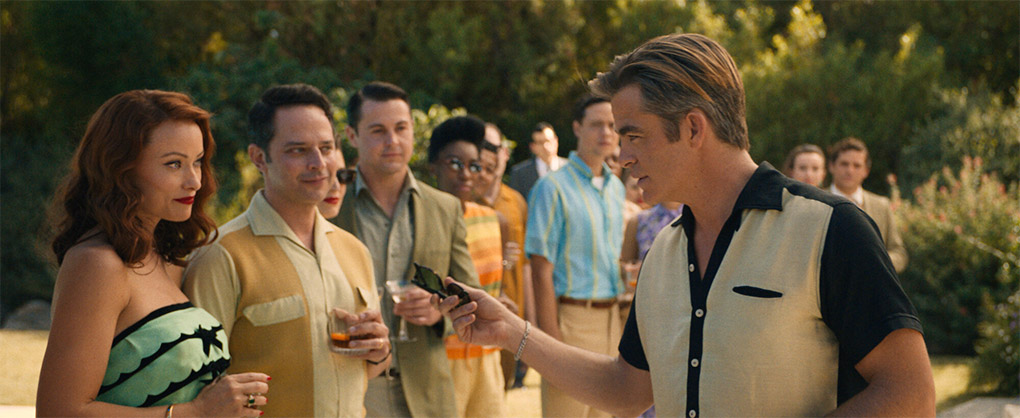| |
'I remember making this tiny horror movie with Mark Duplass many years ago, and he was so understanding of this really terrible schedule that we had. Mark said, "Until you direct a movie, you really can't understand how difficult it is. Go direct, go produce, and then you'll understand," and he was right.' |
| |
Director/actress Olivia Wilde* |
Before…
Wilde has been on my radar since her appearance on the afore mentioned long running medical series, House M.D.. A fine actress with striking looks, she was briefly married to Emmy magnet Jason Sudeikis. Reports have it that it was her idea to turn the comic buffoon advertising the British Premiere League arriving on national US TV a few years ago, into a rounded character with his own TV series. Hidden away on Apple TV+, Ted Lasso exploded if not in a bums-on-sofas subscription eruption but certainly impactful culturally. It deserves everything accolade it gets. It is an extraordinary achievement and its final season is rabidly anticipated this November.
Wilde made the leap to movie directing with Booksmart. She received much praise for her debut and I watched it in preparation for Don't Worry Darling. Let's just say that Booksmart wasn't aimed at me and while I found a lot of things to enjoy about it, I found the central and most important teenage relationship at first cloying and trying way too hard to be cute and authentic. This is also a script issue as well as a 'me' issue. I am a million miles from my late teens but I do remember the fundamentals; a longing to belong, unrequited feelings, the importance of friendships, the agony of instigating anything with anyone else, the sheer bewilderment of having no idea who you are and that first French kiss that rewires your entire being. Of all things, my passion for film helped me navigate some pretty rough seas but the teenagers in Wilde's debut are in a world about as far from my own at that age as human culture can get. Every teenage generation faces the same issues but they each own a little plastic oblong box that can answer any question they may have about the world and everything in it not to mention revealing what sex actually is and the many ways it can be performed… The 17 year old me may have gone somewhat mad and ran from the room terrified by what's on offer on screen so casually these days. I'm a little wiser now (holds finger and thumb a millimetre and a half apart).
I was intrigued and somewhat annoyed at the way critics compare films to other films thereby offering general spoilers without being too specific. I want to see Men (and I will get round to it) because I was hooked by the idea it might have anything to do with the extraordinary body-horror masterpiece Society. But when Don't Worry Darling was compared to a certain film I knew well, I thought… so it's all down to the third act reveal then. And I am a sucker for those films realising that none can ever live up to one's own expectations and hopes for originality. That said The Sting, The Sixth Sense and Fight Club did a damn fine job of sock off-knockage.

After…
While I have every sympathy and support for artists who champion themes in their work, I get the distinct impression that the theme came before the story, the art before the course. It seemed more important to illustrate and allude to insipid male dominance and faux authority over women. These ridiculous men simply wanted their wives to be 'happy' while blithely taking away their wives' rights over their own bodies and indeed lives. That's a great theme still horribly relevant. But the actual story… I feel that the creators of this tale were simply unaware of how often in film and television the trope of 'weird place' with 'weird goings-on' emerges on our screens. And let's face it, we love the mystery aspect of it which is why when this mystery is revealed, it's hardly a mystery at all. There's a sense of disconnect between generations which sometimes, charmingly, shows itself by having a 47 year old song in a 2022 series making number one and putting the sublime Kate Bush back in the public eye. Even my son admitted to me "How come your generation had all the best music?" But the writer of Darling is 30 years old and must be caught up in and deeply affected by the swirling currents of today's cultural cyclonic zeitgeist. I just wished she'd seen a few more movies and TV to try and give her tale a more original twist. But perhaps the seen it all before rug pull was never the point.
So when and where are we? A small number of couples are living 'perfect' lives in a closed off town in a desert environment. It appears to be set in the 50s in North America but from the production design and the colour palette we are obviously in a fake world, physical or otherwise. The first thing that came to mind was the less than stellar Prisoner remake: weirdness in a desert environment. In fact those similarities are more stark and familiar the more I come to think about it. Loving couple Alice and Jack (Florence Pugh and Harry Styles) flounce around snapping on their stereotypes every morning as all the men in the cul-de-sac drive off at the same time in their pastel shaded cars accompanied by era specific hits. It feels like The Fall and Rise of Reginald Perrin produced by Benetton, "Great!, "Super!" flirting with Edward Scissorhands. See? Even I'm doing it now, though that description will not prompt any spoilers except for the colour scheme perhaps.
So where exactly are we if anywhere at all? What secrets are the men hiding, why are the women so 'happy' with a ridiculous cliché of a servile existence, and why on earth does a character have to dance strangely upon receiving a promotion? Before we've had a chance to settle in with the basic set up, Alice starts to have flash hallucinations and experience odd events (empty egg shells, strangely moving panes of glass) strange things that start occurring way too early. All the men are obnoxious bores (as was, it seems, all part of the filmmakers' plan) and the head honcho is modelled on polymath Jordan Peterson (hair style, speech patterns and mannerisms), the suave but nasty Frank (played by Chris Pine).

I am quite willing to believe that no matter how extraordinarily derivative Darling is, it's obviously appealing to people, younger people who don't care that this mystery framing has been used so many times in the past. I have to let go of this absurd notion that you harbour when older, that everyone has had the experience that you've had and knows who certain 'famous' people are and which movie and TV tropes have been done to death. I have already been stunned (my dumb assumption) that a younger friend of mine had never heard of Stanley Kubrick.
I just have to keep reminding myself that to those born in the year of Silence of the Lambs (1991), 1961 is as far from them as 1931 is to me in time, culturally and in every other way . So I will try not to be so insensitive to the filmmakers' goals. On the plus side, there is nothing wrong with Harry Style's performance but it is true that Pugh's powerhouse turn keeps the film on track. The score is original if overused (see later) and if, like me, you like the idea of this colourful, sexual politics-based mystery, then I hope you enjoy it.
Spoiler Alert – if you are intrigued, go and see the film and come back later…
Just a few more thoughts with inevitable spoilers… Last warning…
OK.
Stuck in a computer simulation of a 1950s North America's über-sexist Utopia does not necessarily mean that the software has to function as real-world physics does. If that's a whole chunk of spoiler then you must have had your eyes closed for the first minutes of this perfect village with perfect lives in the middle of a desert schtick. The Matrix got this right which enabled both good and bad guys to exploit its non-real-world potential. Darling's equivalent to The Matrix's Agent Smith are red boiler suited men who have to use vehicles in the same way we do and have to physically do everything real-world style puffing up hills in pursuit of the heroine which makes absolutely no sense. These people, these avatars, these ones and zeroes are simply not bound by physical laws despite the illusion of the deep dream state.
If the reality illustrates that Jack and Alice are laying on a bed using Frank's hardware and software and 'living the dream', what happens when the real Jack needs a pee? Despite the feel of the real, the film implies these people are unconscious and living their lives in the software illusion. Well people do not stay in a dream state unless they're are in a coma. So what happens when Alice's body needs sustenance? She's certainly not getting it physically from her dream despite how lovely those bacon and 'eggs' smell and 'taste'. As you can tell, these lapses in logic drive me crazy. They are plot holes that could accommodate a thousand corpses.
In this 'Paradise' of male dominance and female domestic 'happiness' which consists of cleaning, cooking, shopping and (thank Christ) having their sexual desires satisfied, their independent minds are stripped of authentic character by fake electro-shock therapy within the virtual world. This seems a little odd given the 'real' world is the one breaking through the heroine's mind. A frivolous aside but did male to female oral sex actually exist culturally in the 50s? Of course it did. It just was never mentioned except in novels that were probably quickly banned. "Heavens to Betsy! How dare women be sexually fulfilled! It's outrageous!" disgusted from Tunbridge Wells writes.

The staging of the drift imagery between real and simulation is quite interesting at first. Busby Berkeley females (our small town wives) lay on their backs and move their legs that collectively simulate the iris of the eye or a camera lens. We are treated to a giant close up of an eye beforehand in case we didn't get it but this 'drift imagery' is used over and over again. I started to fidget at the second and other repetitions.
Politically there's enough for the filmmakers to lay out and pick at. Men want to control women and make them happy even if that act denies them agency of their own. How many times have blistering arguments erupted after one half of a couple says "I did it to make you happy!" It's clear to intelligent human beings that forcing someone against their will to be happy is not the behaviour of a loving individual. It's the Ludovico Technique. This makes all the men in this movie, scared, small, coercive gaslighters. Yay, go harmonic worldview!
I think the filmmakers over-relied on what's known in the trade as 'needle drops', vinyl to digital, period songs in the public perception as being stuck in the 50s. Booksmart is choc-a-bloc with pop songs, you might say overflowing, to the point where you just crave a little quiet time. Music has a powerful effect on a film but it can be too much of a good thing. The original score by Jason Bourne alumnus John Powell is… (wow, talk about cognitive dissonance). I was about to suggest ways in which the score may be too overbearing and now, once I re-discovered it was written by one of my favourite film composers (I did actually clock this in the cinema), I relented. That's craven. I'll strike a compromise. At first the vocalisations, the dislocated breaths and ululations had me intrigued. They seemed like all the tense groans and breathy climaxes of orgasms long gone or even the ghosts of those never experienced at all. They sounded like Jane Birkin and Serge Gainsburg's outtakes from their seductive hit Je T'aime in 1969, mixed with Jason Bourne's bass thumps and stirring crescendos. A darkly sexier movie soundtrack you'd be hard pressed (no pun intended) to find.
The cues were skewed enough to be unsettling but they were trying too hard and were too early to produce real nervousness. That audio crunch that sometimes suggests a popped speaker somewhere in the auditorium is also jagged and unnerving but simply put, there's too much heavy handed score grabbing you by the shoulders, shaking you and shouting "Get it! It's WEIRD!!! Get it!? GET IT???" We've known it's weird from the first scene of the film. This underscore works with an amnesiac spy running through Germany but seems far too big and overbearing for Florence Pugh's escape from the male clutch in a white blood-stained dress. Having played the score a few times while writing this review, I have to say that it's more appreciated as a stand-alone experience but I stick by the idea it is overused and overwrought in places as laid in the film itself.

Finally there's that modern canard that if you are killed in a simulation, you die in real life. Gamers would be sad (and dead 10,000 times over) to hear that. From The Matrix (where I presume the filmmakers got this odd bit of convenient jeopardy) the idea is that because you believe wholeheartedly in the reality of the world you live in, that belief will cause your body to respond appropriately to any deathy situations. Inconveniently, most of the heroes of The Matrix knew damn well they were in a simulation as do all the men and a few women in Darling. So how does that work? Oh, I know, because it prompts the audience to be invested if we know how dangerous this situation is. Well, not this audience.
As you may tell, I wanted to love this film. It had all the ingredients of a mainstream thriller that promised so much in the trailer and the lead up to the third act reveal. But ultimately it tried too hard to make us feel things were weird too early and not nearly hard enough to convince us that the setting was anything but a simulation. That ice was so thin, there was no suspense or surprise when someone broke through it. I urge you to see it if you are not as familiar with common film tropes as I am although if you're read this far, you may now be too familiar with them too. My apologies.
|